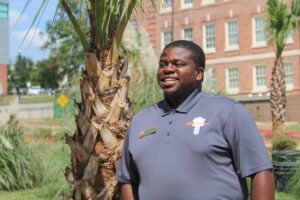
There is a natural scare factor that comes with testing positive for COVID-19. Not knowing where or when you could have contracted the virus, or who you could have infected, leaves a trail of questions running through your head.
Florida A&M University student Jairus Williams had all these questions and more when he tested positive for COVID-19 on Sept. 9.
“I was upset,” said Williams. “I felt some type of way towards myself because out of all the precautionary measures I tried to make sure I completed, I still managed to get COVID. I also knew that being in quarantine meant being away from the people I cared about and hung with daily.”
Williams was tested as part of a biweekly routine for all Resident Assistants on FAMU’s campus. He received his results that Friday afternoon while working his desk shift. With no immediate symptoms or harsh illnesses, Williams considered himself asymptomatic — producing or showing no symptoms.
The protocol for students living on campus who test positive is for them to quarantine in Palmetto North for 10 consecutive days. Metz Food Services also provides meals throughout the day for each student.
Williams knew he would be taken care of moving forward; but he also felt the responsibility to inform those he was around leading up to his results. This way they could get tested.
“When he told our friend group, we were so shocked and sad,” senior Resident Assistant and close friend Ciara Brown said.
Brown spent quite a bit of time with Williams leading up to his results. With the same testing requirements applying to her as a Resident Assistant, Brown got tested the day before. Her results came back negative.
According to Williams, all those he associated with came back with negative test results. Not only that, those same friends took it upon themselves to look after him, in the safest way they could, while Williams was in quarantine.
“It was just my duty to do what a friend was supposed to do,” Brown said. “Jairus is my brother. If that was talking to him for hours on FaceTime or bringing him food and having to drop it off in the weirdest ways because we had to stay distant. He is a super social person, so we had to maintain his human contact.”
Knowing that Williams had the love and support of his friends and coworkers helped him make it to his “first day out.”
“It was that caring aspect that I really appreciated,” said Williams. “They made things go a bit smoother and a little bit better, versus me being in this by myself.”
Williams also commended university housing on the initiatives taken to ensure that RAs’ health statuses are monitored properly.
“I believe in all honesty that the policy housing has implemented is great because I consider us to be front line workers as RA’s. Dealing with residents and other faculty throughout the building, I do believe that we should be getting tested frequently.”
With that in mind, Williams feels that it is everyone’s responsibility to keep each other safe and informed.
FAMU residents are only encouraged to get tested, unlike at Florida State University.
FSU Health Services mandated that all students physically living on campus participate in COVID-19 testing as part of the housing contract.
Florida A&M University does not require these same procedures.
While some are surprised by the reported 1,402 positive cases at FSU between its students and faculty as of Sept. 18, Williams believes FAMU numbers are just as high. According to the Tallahassee Democrat, The FAMU COVID-19 Dashboard shows that only 63 total positive tests — 41 students and 22 employees, have been recorded since Aug. 1.
The numbers include on- and off-campus reported cases.
“I do believe that FAMU has way more cases than what is reported,” said Williams. “FSU students are not the only ones attending pool parties, and games, and social gatherings. The difference between our community and their community is they go and get tested.”
Along with his coworkers, Williams often encourages residents to go get tested at the free testing site located at Bragg Memorial Stadium on campus. They even take the initiative to take group trips with their residents on the same days designated for RA testing.
COVID-19 results are handled with discretion whether a student tests positive or not. It is the student’s responsibility to share their results with the proper authorities, being their Resident Assistant or director along with Tanya Tatum, the Student Health Services director. Fulfilling these steps can ensure the proper protocol is taken to ensure the safety of campus students and faculty.
Williams believes that if students are aware of the resources available on campus, they will take the initiative to get tested, and when necessary, share their results.